Hi!
My project use ASP.NET Core MVC & jQuery Project.
I am testing using IS4 however I am having 1 problem.
When I do not using https everything works.
But when I switched to using https I get an error:
ERROR 2020-10-06 17:14:44,302 [4 ] e.Diagnostics.ExceptionHandlerMiddleware - An unhandled exception has occurred while executing the request.
System.InvalidOperationException: IDX20803: Unable to obtain configuration from: 'https://one.vn/.well-known/openid-configuration'.
---> System.IO.IOException: IDX20804: Unable to retrieve document from: 'https://one.vn/.well-known/openid-configuration'.
---> System.Net.Http.HttpRequestException: The SSL connection could not be established, see inner exception.
---> System.Security.Authentication.AuthenticationException: The remote certificate is invalid according to the validation procedure.
at System.Net.Security.SslStream.StartSendAuthResetSignal(ProtocolToken message, AsyncProtocolRequest asyncRequest, ExceptionDispatchInfo exception)
at System.Net.Security.SslStream.CheckCompletionBeforeNextReceive(ProtocolToken message, AsyncProtocolRequest asyncRequest)
at System.Net.Security.SslStream.StartSendBlob(Byte[] incoming, Int32 count, AsyncProtocolRequest asyncRequest)
at System.Net.Security.SslStream.ProcessReceivedBlob(Byte[] buffer, Int32 count, AsyncProtocolRequest asyncRequest)
at System.Net.Security.SslStream.StartReadFrame(Byte[] buffer, Int32 readBytes, AsyncProtocolRequest asyncRequest)
at System.Net.Security.SslStream.StartReceiveBlob(Byte[] buffer, AsyncProtocolRequest asyncRequest)
at System.Net.Security.SslStream.CheckCompletionBeforeNextReceive(ProtocolToken message, AsyncProtocolRequest asyncRequest)
at System.Net.Security.SslStream.StartSendBlob(Byte[] incoming, Int32 count, AsyncProtocolRequest asyncRequest)
at System.Net.Security.SslStream.ProcessReceivedBlob(Byte[] buffer, Int32 count, AsyncProtocolRequest asyncRequest)
at System.Net.Security.SslStream.StartReadFrame(Byte[] buffer, Int32 readBytes, AsyncProtocolRequest asyncRequest)
at System.Net.Security.SslStream.PartialFrameCallback(AsyncProtocolRequest asyncRequest)
--- End of stack trace from previous location where exception was thrown ---
at System.Net.Security.SslStream.ThrowIfExceptional()
at System.Net.Security.SslStream.InternalEndProcessAuthentication(LazyAsyncResult lazyResult)
at System.Net.Security.SslStream.EndProcessAuthentication(IAsyncResult result)
at System.Net.Security.SslStream.EndAuthenticateAsClient(IAsyncResult asyncResult)
at System.Net.Security.SslStream.<>c.<AuthenticateAsClientAsync>b__65_1(IAsyncResult iar)
at System.Threading.Tasks.TaskFactory1.FromAsyncCoreLogic(IAsyncResult iar, Func2 endFunction, Action1 endAction, Task1 promise, Boolean requiresSynchronization)
--- End of stack trace from previous location where exception was thrown ---
at System.Net.Http.ConnectHelper.EstablishSslConnectionAsyncCore(Stream stream, SslClientAuthenticationOptions sslOptions, CancellationToken cancellationToken)
--- End of inner exception stack trace ---
at System.Net.Http.ConnectHelper.EstablishSslConnectionAsyncCore(Stream stream, SslClientAuthenticationOptions sslOptions, CancellationToken cancellationToken)
at System.Net.Http.HttpConnectionPool.ConnectAsync(HttpRequestMessage request, Boolean allowHttp2, CancellationToken cancellationToken)
at System.Net.Http.HttpConnectionPool.CreateHttp11ConnectionAsync(HttpRequestMessage request, CancellationToken cancellationToken)
at System.Net.Http.HttpConnectionPool.GetHttpConnectionAsync(HttpRequestMessage request, CancellationToken cancellationToken)
at System.Net.Http.HttpConnectionPool.SendWithRetryAsync(HttpRequestMessage request, Boolean doRequestAuth, CancellationToken cancellationToken)
at System.Net.Http.RedirectHandler.SendAsync(HttpRequestMessage request, CancellationToken cancellationToken)
at System.Net.Http.DiagnosticsHandler.SendAsync(HttpRequestMessage request, CancellationToken cancellationToken)
at System.Net.Http.HttpClient.FinishSendAsyncBuffered(Task1 sendTask, HttpRequestMessage request, CancellationTokenSource cts, Boolean disposeCts) at Microsoft.IdentityModel.Protocols.HttpDocumentRetriever.GetDocumentAsync(String address, CancellationToken cancel) --- End of inner exception stack trace --- at Microsoft.IdentityModel.Protocols.HttpDocumentRetriever.GetDocumentAsync(String address, CancellationToken cancel) at Microsoft.IdentityModel.Protocols.OpenIdConnect.OpenIdConnectConfigurationRetriever.GetAsync(String address, IDocumentRetriever retriever, CancellationToken cancel) at Microsoft.IdentityModel.Protocols.ConfigurationManager1.GetConfigurationAsync(CancellationToken cancel)
--- End of inner exception stack trace ---
at Microsoft.IdentityModel.Protocols.ConfigurationManager1.GetConfigurationAsync(CancellationToken cancel) at Microsoft.AspNetCore.Authentication.OpenIdConnect.OpenIdConnectHandler.HandleChallengeAsyncInternal(AuthenticationProperties properties) at Microsoft.AspNetCore.Authentication.OpenIdConnect.OpenIdConnectHandler.HandleChallengeAsync(AuthenticationProperties properties) at Microsoft.AspNetCore.Authentication.AuthenticationHandler1.ChallengeAsync(AuthenticationProperties properties)
at Microsoft.AspNetCore.Authentication.AuthenticationService.ChallengeAsync(HttpContext context, String scheme, AuthenticationProperties properties)
at Microsoft.AspNetCore.Mvc.ChallengeResult.ExecuteResultAsync(ActionContext context)
at Microsoft.AspNetCore.Mvc.Infrastructure.ResourceInvoker.<InvokeNextResultFilterAsync>g__Awaited|29_0[TFilter,TFilterAsync](ResourceInvoker invoker, Task lastTask, State next, Scope scope, Object state, Boolean isCompleted)
at Microsoft.AspNetCore.Mvc.Infrastructure.ResourceInvoker.Rethrow(ResultExecutedContextSealed context)
at Microsoft.AspNetCore.Mvc.Infrastructure.ResourceInvoker.ResultNext[TFilter,TFilterAsync](State& next, Scope& scope, Object& state, Boolean& isCompleted)
at Microsoft.AspNetCore.Mvc.Infrastructure.ResourceInvoker.<InvokeResultFilters>g__Awaited|27_0(ResourceInvoker invoker, Task lastTask, State next, Scope scope, Object state, Boolean isCompleted)
at Microsoft.AspNetCore.Mvc.Infrastructure.ResourceInvoker.<InvokeNextResourceFilter>g__Awaited|24_0(ResourceInvoker invoker, Task lastTask, State next, Scope scope, Object state, Boolean isCompleted)
at Microsoft.AspNetCore.Mvc.Infrastructure.ResourceInvoker.Rethrow(ResourceExecutedContextSealed context)
at Microsoft.AspNetCore.Mvc.Infrastructure.ResourceInvoker.Next(State& next, Scope& scope, Object& state, Boolean& isCompleted)
at Microsoft.AspNetCore.Mvc.Infrastructure.ResourceInvoker.<InvokeFilterPipelineAsync>g__Awaited|19_0(ResourceInvoker invoker, Task lastTask, State next, Scope scope, Object state, Boolean isCompleted)
at Microsoft.AspNetCore.Mvc.Infrastructure.ResourceInvoker.<InvokeAsync>g__Awaited|17_0(ResourceInvoker invoker, Task task, IDisposable scope)
at Microsoft.AspNetCore.Routing.EndpointMiddleware.<Invoke>g__AwaitRequestTask|6_0(Endpoint endpoint, Task requestTask, ILogger logger)
at Microsoft.AspNetCore.Localization.RequestLocalizationMiddleware.Invoke(HttpContext context)
at Microsoft.AspNetCore.Authorization.AuthorizationMiddleware.Invoke(HttpContext context)
at Abp.AspNetZeroCore.Web.Authentication.JwtBearer.JwtTokenMiddleware.<>c__DisplayClass0_0.<<UseJwtTokenMiddleware>b__0>d.MoveNext()
--- End of stack trace from previous location where exception was thrown ---
at Microsoft.AspNetCore.Authentication.AuthenticationMiddleware.Invoke(HttpContext context)
at Microsoft.AspNetCore.Diagnostics.ExceptionHandlerMiddleware.<Invoke>g__Awaited|6_0(ExceptionHandlerMiddleware middleware, HttpContext context, Task task)
I tried to fix it but it still doesn't work:
https://stackoverflow.com/questions/37693516/unable-to-obtain-configuration-from-well-known-openid-configuration
https://github.com/IdentityServer/IdentityServer4/issues/3039
Support me pls!
Thanks
6 Answer(s)
-
0
hi
The remote certificate is invalid according to the validation procedure.
Is your website's certificate configured correctly?
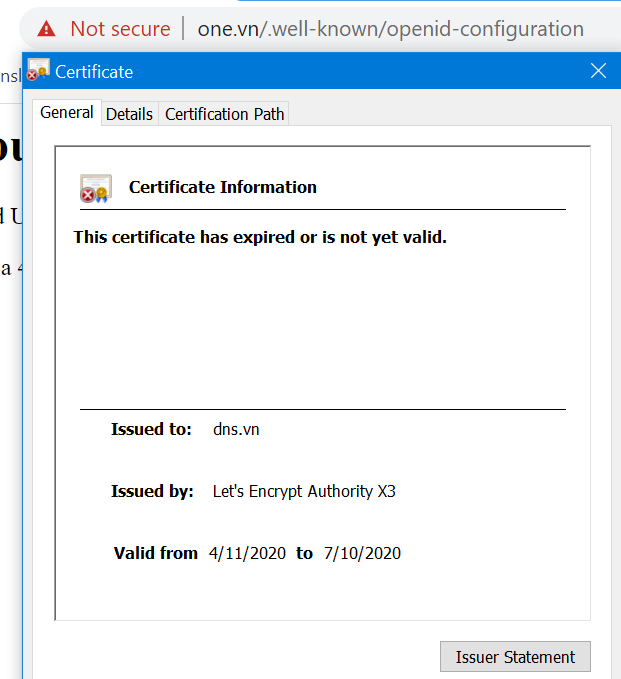
-
0
Hi,
Here are my settings .All are configured on my laptop, you can see:
IIS config:
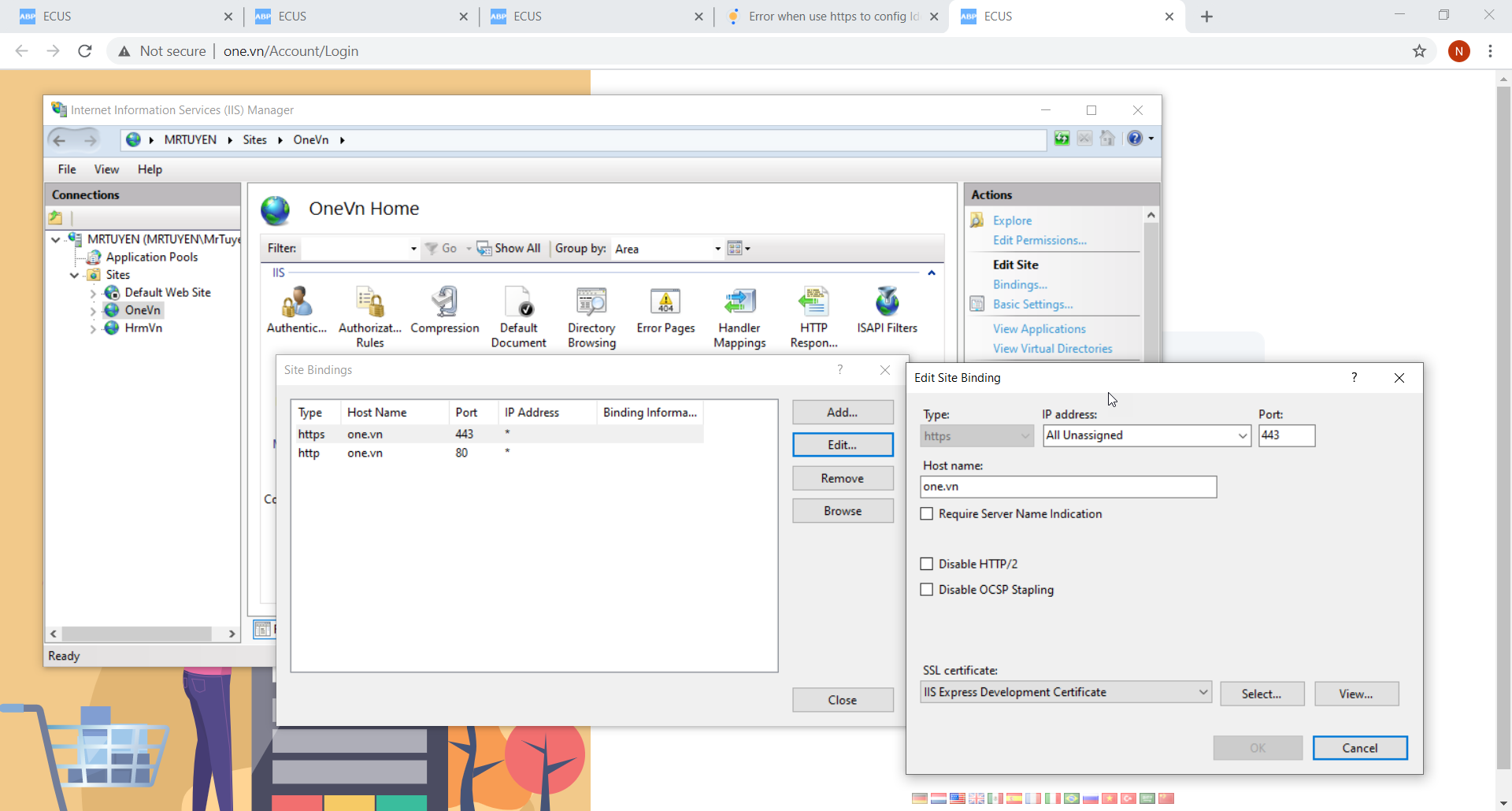
hosts
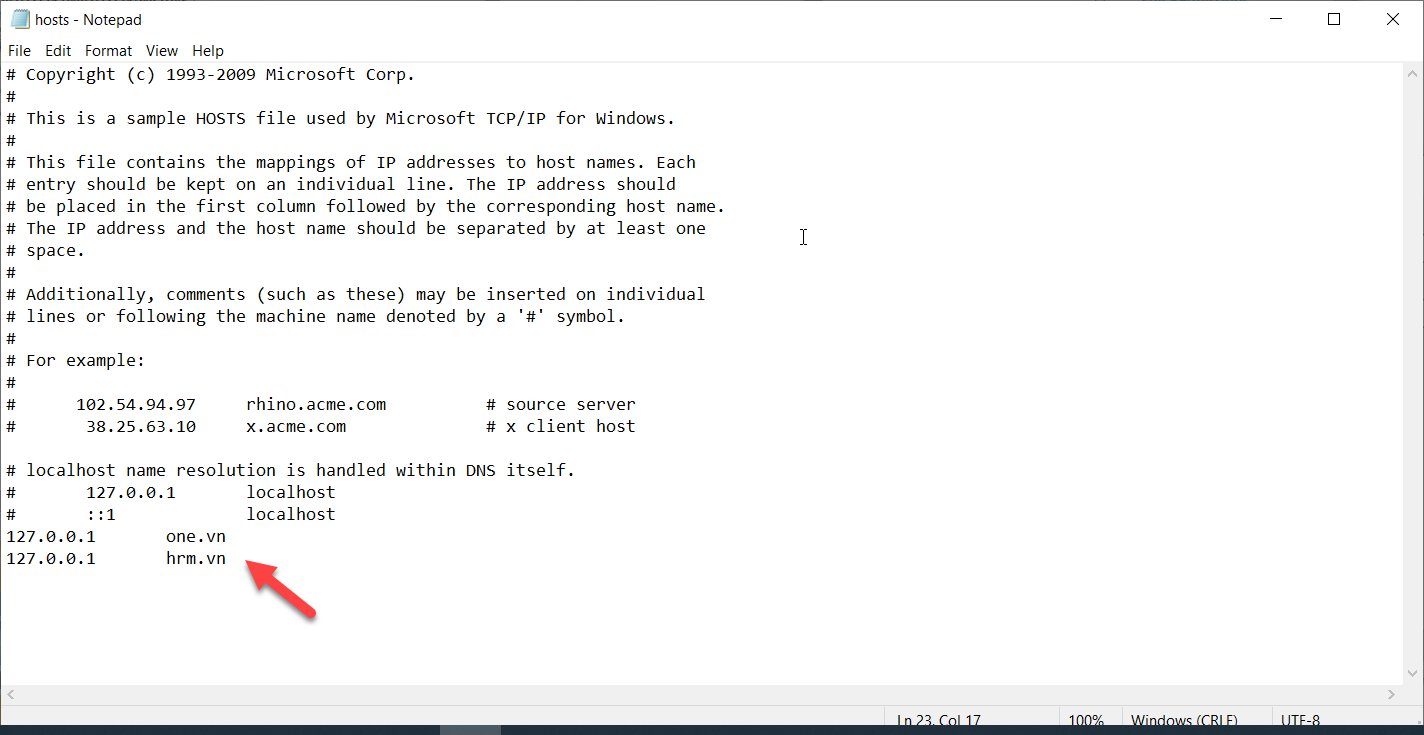
cert onevn
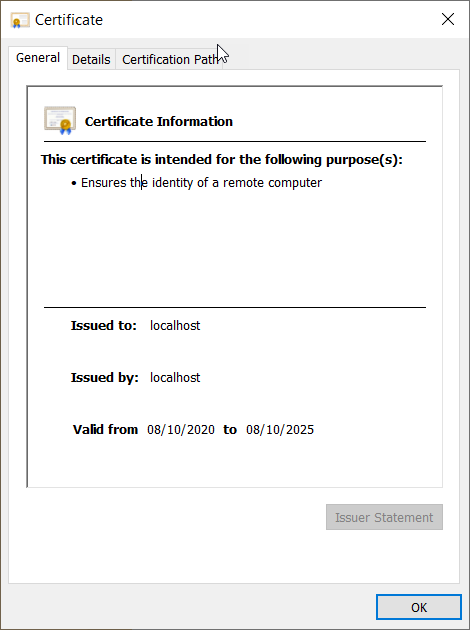
IS4 config
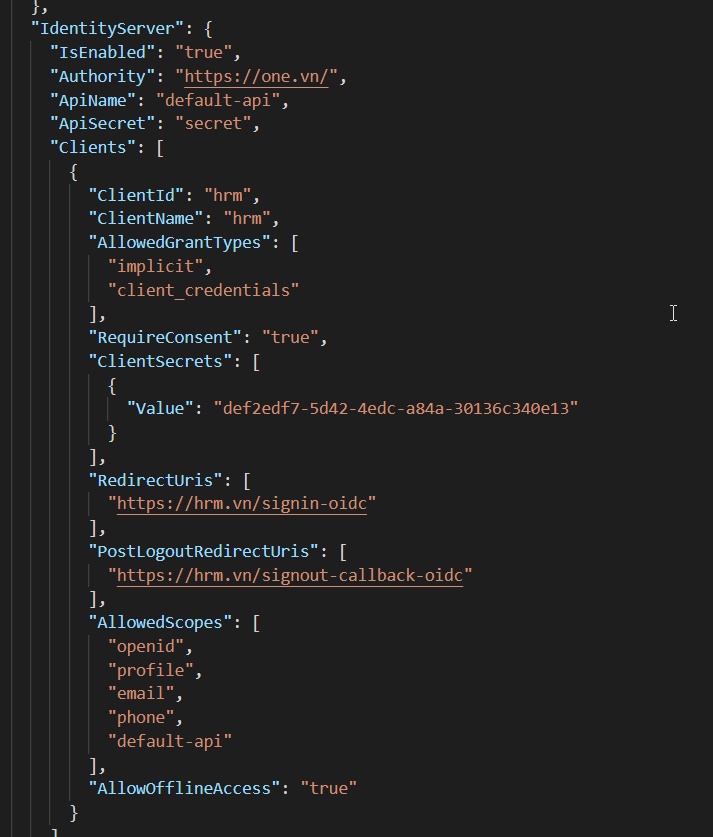
OpenId config
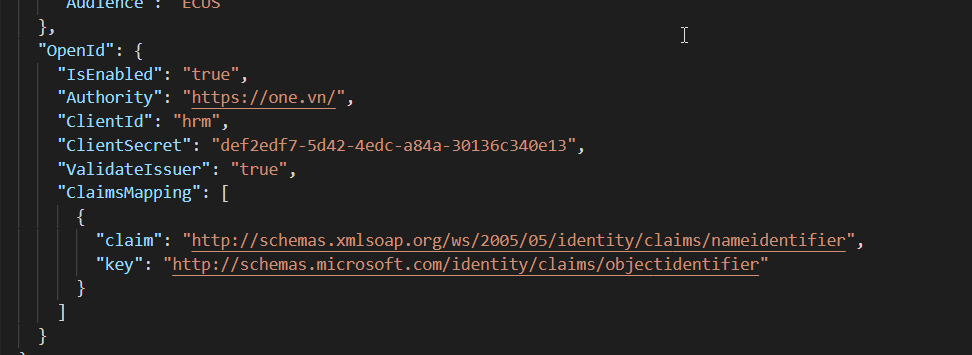
And error logs:
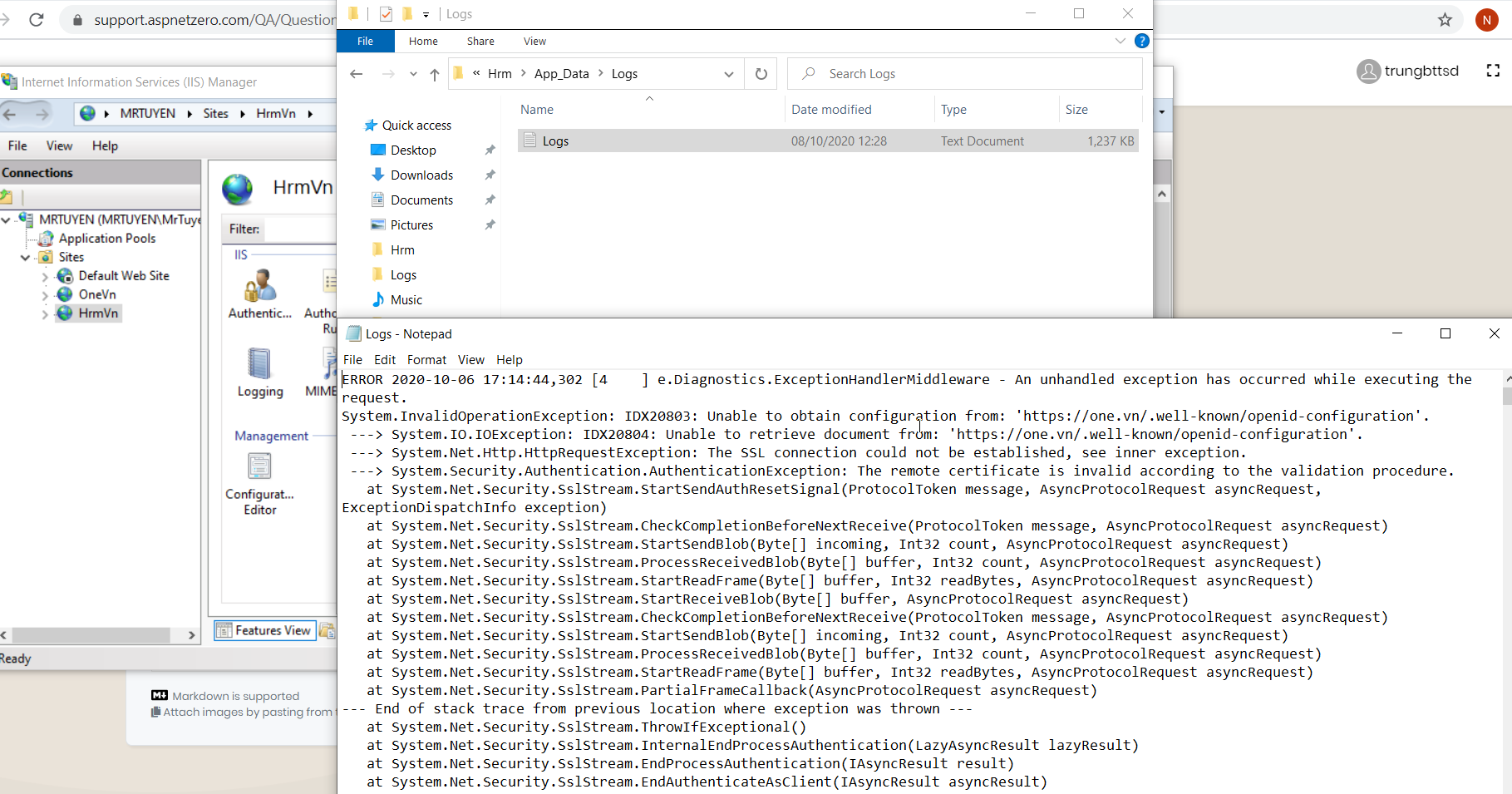
-
0
Hi,
This is a certificate issue as @maliming pointed out. You can try to re-generate your ASP.NET Core certificate (see https://docs.microsoft.com/en-us/aspnet/core/security/enforcing-ssl?view=aspnetcore-3.1&tabs=visual-studio#all-platforms---certificate-not-trusted).
Or, you can include option below to your IdentityServer configuration for local usage;
options.JwtBackChannelHandler = new HttpClientHandler { ServerCertificateCustomValidationCallback = HttpClientHandler.DangerousAcceptAnyServerCertificateValidator } -
0
Hi,
I have followed each of the above but it still doesn't work
I also tried switching to localhost without using the domain local in hosts file but the results are still the same. not working :(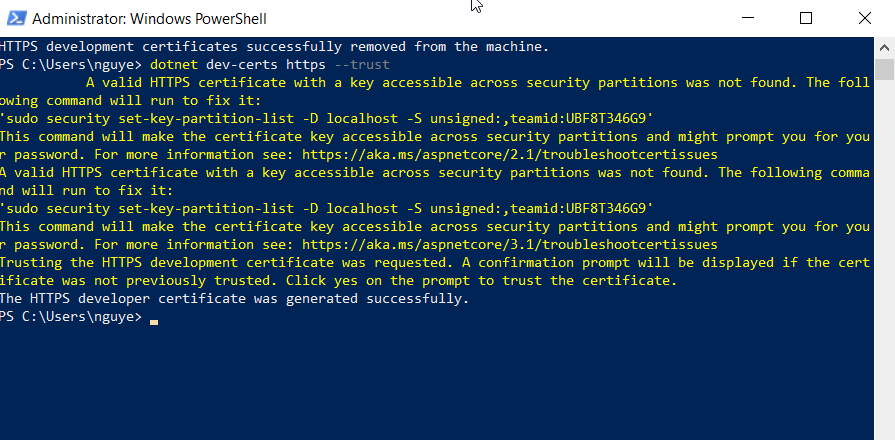

-
0
hi trungbttsd3
Can I check it remotely? please send your teamviewer info to my email. liming.ma@volosoft.com
-
0
Solved remotely.